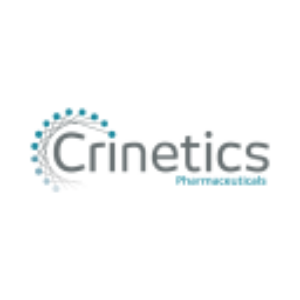Crinetics Receives FDA Orphan Drug Designation for Atumelnant in the Treatment of Congenital Adrenal Hyperplasia (CAH)
Rhea-AI Summary
Crinetics Pharmaceuticals (Nasdaq: CRNX) announced that its drug candidate atumelnant received FDA Orphan Drug Designation for treating congenital adrenal hyperplasia (CAH). Atumelnant is the first and only small molecule ACTH receptor antagonist in clinical development.
The company reported positive Phase 2 results in January 2025, showing up to 80% mean reduction in androstenedione and improvements in clinical symptoms. Crinetics plans to initiate Phase 3 CALM-CAH study in adults and Phase 2/3 BALANCE-CAH study in pediatrics in H2 2025.
The Orphan Drug Designation provides benefits including potential financial incentives and seven years of market exclusivity upon approval for treating this rare disease affecting fewer than 200,000 people in the U.S.
Positive
- First-in-class ACTH receptor antagonist with novel mechanism of action
- Strong Phase 2 results showing 80% mean reduction in key biomarkers
- FDA Orphan Drug Designation provides 7 years market exclusivity
- Dual development program targeting both adult and pediatric patients
Negative
- Phase 3 trials yet to begin, with significant clinical development still ahead
- Competition from existing glucocorticoid treatments despite their limitations
News Market Reaction
On the day this news was published, CRNX gained 1.07%, reflecting a mild positive market reaction. This price movement added approximately $32M to the company's valuation, bringing the market cap to $2.99B at that time.
Data tracked by StockTitan Argus on the day of publication.
SAN DIEGO, Aug. 21, 2025 (GLOBE NEWSWIRE) -- Crinetics Pharmaceuticals, Inc. (Nasdaq: CRNX) today announced that the U.S. Food and Drug Administration (FDA) granted Orphan Drug Designation (ODD) for atumelnant, a novel, once-daily oral adrenocorticotropic hormone (ACTH) receptor antagonist candidate for the proposed treatment of classic congenital adrenal hyperplasia (CAH). Atumelnant is the first and only small molecule ACTH receptor antagonist in clinical development.
“Receiving Orphan Drug Designation from the FDA underscores the significant unmet need faced by people living with CAH,” said Dana Pizzuti, M.D., Chief Medical and Development Officer of Crinetics. “Through atumelnant’s innovative mechanism of action, we have developed an ambitious and uncompromising endpoint for our Phase 3 trial, which can demonstrate the ability to restore normal levels of adrenal androgens and reduce glucocorticoid supplementation to physiologic levels. We will also document other changes in clinical disease markers and symptoms that improve quality of life for patients.”
In January 2025, Crinetics reported robust positive topline results from the Phase 2 TouCAHn trial of atumelnant in adults with classic CAH. The study demonstrated substantial, rapid and sustained reductions of key biomarkers across doses, including up to an
CAH is caused by genetic mutations that result in impaired cortisol synthesis. This lack of cortisol leads to a breakdown of feedback mechanisms and results in persistently high levels of ACTH that in turn results in the over secretion of steroids, particularly androgens like androstenedione, and steroid precursors. High levels of androgens can manifest as reduced fertility in men and women, excessive facial hair and acne in women, and painful testicular adrenal rest tumors in men. Patients also need cortisol supplementation to replace the missing cortisol. However, the current treatment paradigm involves chronic glucocorticoid steroid supplementation, often at supraphysiologic levels, which can lead to significant additional medical problems associated with glucocorticoid excess including weight gain, diabetes, cardiovascular issues, and osteoporosis.
The FDA provides ODD status to drugs intended for the safe and effective treatment, diagnosis, or prevention of rare diseases that affect fewer than 200,000 people in the U.S. Benefits of the designation may include exemption from certain FDA fees, financial incentives for qualified clinical development, and seven years of market exclusivity in the U.S. if the treatment is approved.
About Atumelnant
Atumelnant, Crinetics’ second investigational compound, is the first in class and only once-daily, oral adrenocorticotropic hormone (ACTH) receptor antagonist that acts selectively at the melanocortin type 2 receptor (MC2R) on the adrenal gland. Diseases associated with excess ACTH can have significant impact on physical and mental health. Novel atumelnant has exhibited strong binding affinity for MC2R in preclinical models and has demonstrated suppression of adrenally derived glucocorticoids and androgens that are under the control of ACTH. Data from a 12-week Phase 2 study consistently demonstrated compelling treatment benefits of atumelnant, evidenced by the rapid, substantial and sustained statistically significant reductions in key CAH disease related biomarkers, including A4 and 17-hydroxyprogesterone, in a diverse population. Currently in development, atumelnant holds the potential to offer transformational care for individuals living with congenital adrenal hyperplasia and ACTH-dependent Cushing’s syndrome. This breakthrough could revolutionize the management of these conditions, providing hope for unprecedented improvements in quality of life.
About Crinetics Pharmaceuticals
Crinetics Pharmaceuticals is a clinical-stage pharmaceutical company focused on the discovery, development, and commercialization of novel therapeutics for endocrine diseases and endocrine-related tumors. All of the company’s drug candidates are small molecule, new chemical entities resulting from in-house drug discovery efforts. Crinetics’ lead development candidate, PALSONIFY™ (paltusotine), is the first investigational once-daily, oral, selective somatostatin receptor type 2 (SST2) nonpeptide agonist that is in clinical development for acromegaly. Paltusotine is also in clinical development for carcinoid syndrome associated with neuroendocrine tumors. Atumelnant is currently in development for congenital adrenal hyperplasia and ACTH-dependent Cushing’s syndrome. Additional discovery programs address a variety of endocrine conditions, such as hyperparathyroidism, polycystic kidney disease, Graves’ disease (including thyroid eye disease), diabetes, obesity and GPCR-targeted oncology indications.
Forward-Looking Statements
This press release contains forward-looking statements within the meaning of Section 27A of the Securities Act of 1933, as amended, and Section 21E of the Securities Exchange Act of 1934, as amended. All statements other than statements of historical facts contained in this press release are forward-looking statements, including statements regarding the plans and timelines for the clinical development of atumelnant and paltusotine, including the therapeutic potential and clinical benefits or safety profile thereof; the expected timing of initiation of a Phase 3 program for atumelnant for CAH and for a Phase 2/3 program of atumelnant for ACTH-dependent Cushing’s syndrome; or the therapeutic potential for our development candidatesto transition to clinical development; . In some cases, you can identify forward-looking statements by terms such as “may,” “will,” “should,” “expect,” “plan,” “anticipate,” “could,” “intend,” “target,” “project,” “contemplates,” “believes,” “estimates,” “predicts,” “potential,” “upcoming” or “continue” or the negative of these terms or other similar expressions. These forward-looking statements speak only as of the date of this press release and are subject to a number of risks, uncertainties and assumptions, including, without limitation, data that we report may change following completion or a more comprehensive review of the data related to the clinical studies, and the FDA and other regulatory authorities may not agree with our interpretation of such results; we may not be able to obtain, maintain and enforce our patents and other intellectual property rights, and it may be prohibitively difficult or costly to protect such rights; geopolitical events may disrupt Crinetics’ business and that of the third parties on which it depends, including delaying or otherwise disrupting its clinical studies and preclinical studies, manufacturing and supply chain, or impairing employee productivity; unexpected adverse side effects or inadequate efficacy of the Company’s product candidates that may limit their development, regulatory approval and/or commercialization; the Company’s dependence on third parties in connection with product manufacturing, research and preclinical and clinical testing; the success of Crinetics’ clinical studies and nonclinical studies; regulatory developments or political changes, including policies related to pricing and pharmaceutical drug reimbursement, in the United States and foreign countries; clinical studies and preclinical studies may not proceed at the time or in the manner expected, or at all; the timing and outcome of research, development and regulatory review is uncertain, and Crinetics’ drug candidates may not advance in development or be approved for marketing; Crinetics may use its capital resources sooner than expected or our cash burn rate may accelerate; any future impacts to our business resulting from geopolitical developments outside our control; and the other risks and uncertainties described in the Company’s periodic filings with the Securities and Exchange Commission (SEC). The events and circumstances reflected in the company’s forward-looking statements may not be achieved or occur and actual results could differ materially from those projected in the forward-looking statements. Additional information on risks facing Crinetics can be found under the heading “Risk Factors” in Crinetics’ periodic filings with the SEC, including its annual report on Form 10-K for the year ended December 31, 2024 and quarterly report on Form 10-Q for the quarter ended June 30, 2025. You are cautioned not to place undue reliance on these forward-looking statements, which speak only as of the date hereof. Except as required by applicable law, Crinetics does not plan to publicly update or revise any forward-looking statements contained herein, whether as a result of any new information, future events, changed circumstances or otherwise.
Investors:
Gayathri Diwakar
Head of Investor Relations
gdiwakar@crinetics.com
(858) 345-6340
Media:
Natalie Badillo
Head of Corporate Communications
nbadillo@crinetics.com
(858) 345-6075






